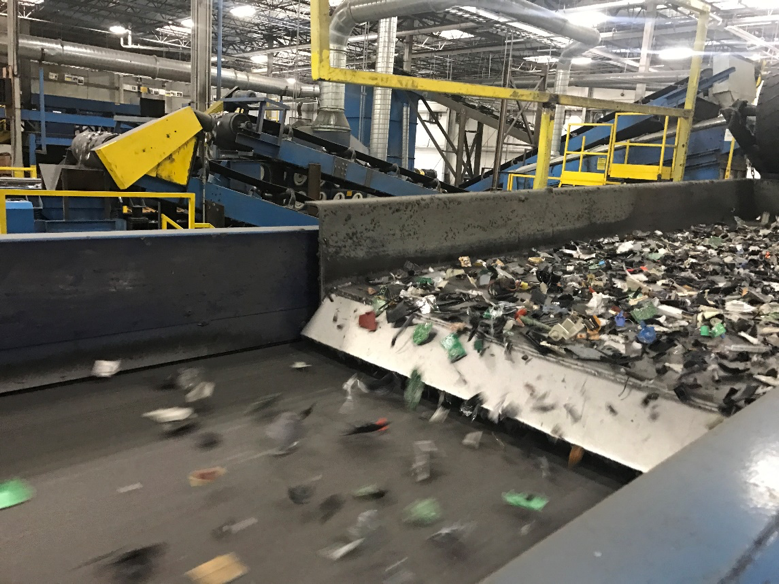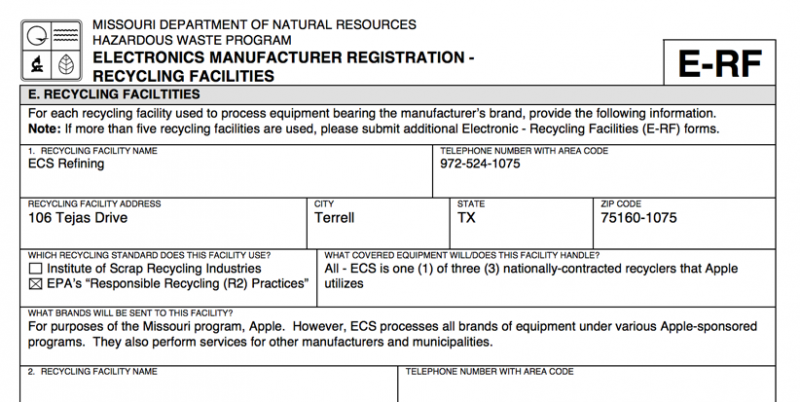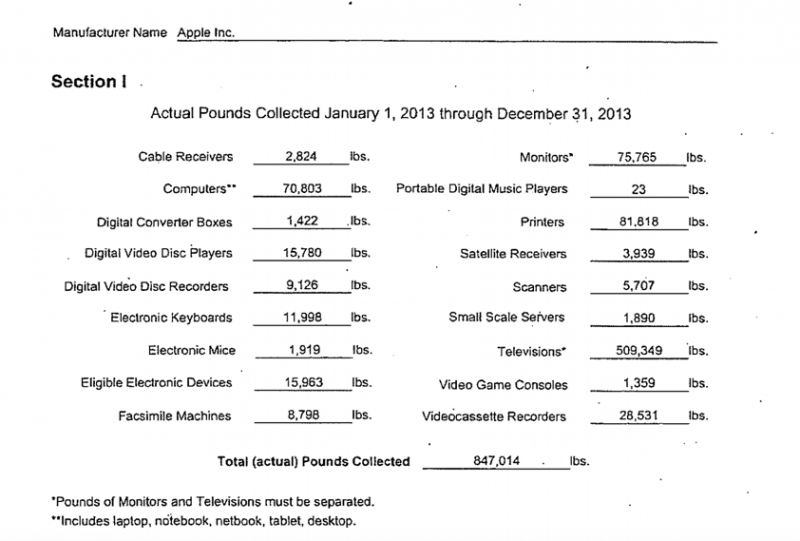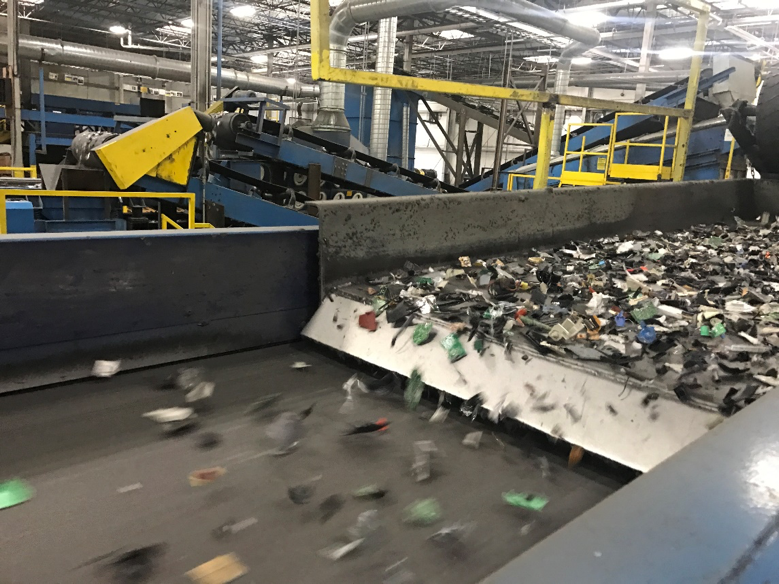
Apr 21 2017, 4:51am
Documents obtained by Motherboard: "No reuse. No parts harvesting. No resale."
Apple released its Environmental Responsibility Report Wednesday, an annual grandstanding effort that the company uses to position itself as a progressive, environmentally friendly company. Behind the scenes, though, the company undermines attempts to prolong the lifespan of its products.
Apple's new moonshot plan is to make iPhones and computers entirely out of recycled materials by putting pressure on the recycling industry to innovate. But documents obtained by Motherboard using Freedom of Information requests show that Apple's current practices prevent recyclers from doing the most environmentally friendly thing they could do: Salvage phones and computers from the scrap heap.
Apple rejects current industry best practices by forcing the recyclers it works with to shred iPhones and MacBooks so they cannot be repaired or reused—instead, they are turned into tiny shards of metal and glass.
"Materials are manually and mechanically disassembled and shredded into commodity-sized fractions of metals, plastics, and glass," John Yeider, Apple's recycling program manager, wrote under a heading called "Takeback Program Report" in a 2013 report to Michigan Department of Environmental Quality. "All hard drives are shredded in confetti-sized pieces. The pieces are then sorted into commodities grade materials. After sorting, the materials are sold and used for production stock in new products. No reuse. No parts harvesting. No resale."

From Apple's 2013 recycling report to Michigan.
Apple is fundamentally a manufacturer, not a recycling company. While its two Liam "recycling robots" looks cool in an ad, they're only capable of disassembling a total of 2.4 million phones per year; Apple sold 215.3 million iPhones in 2016. Most iPhones simply aren't making it back to Apple, and Apple doesn't have the capacity to recycle these phones.
But the company is responsible for recycling thousands of tons of electronics per year thanks to a series of state-level "manufacturer responsibility" laws that require electronics companies to recycle e-waste each year based on their overall sales in that state. To learn more about its recycling practices, I have spent the last year collecting Apple's state recycling reports using Freedom of Information laws around the country.

Documents from Missouri, North Carolina, Illinois, Maryland, Oklahoma, Washington, Michigan, and Wisconsin obtained using these FOI requests confirmed several things:
A) Almost all of Apple's recycling is contracted out to third parties
B) Apple products account for a tiny fraction of its overall recycling practice
C) Apple does indeed have so-called "must shred" agreements with recyclers that bar them from salvaging any e-waste
According to documents filed with the Missouri Department of Natural Resources, Apple works with "three nationally contracted recyclers." Piecing together information from several states, these recyclers are SIMS Recycling Solutions, ECS Refining, and Metech Recycling, though several recyclers I've spoken to believe Apple works with other companies as well. Apple also uses Dynamic Recycling and Advanced Technology Recycling to collect products that other companies will then recycle, and uses a company called call2recycle to recycle the batteries it collects at its retail stores.
From Apple's report to North Carolina Department of Environmental Quality
In 2012 in Michigan, for example, SIMS collected 412.25 tons of material on behalf of Apple; just .25 tons of this was via Apple's mailback programs, which presumably have a higher percentage of Apple products than standard e-waste collection events. The amount collected through Apple stores was so negligible that it did not even register on the report.
It's not unusual that a manufacturer would use third party recyclers, but it's important to understand how the system works. Because these companies are working on Apple's behalf, Apple has complete control over what ultimately happens to the e-waste they collect. And Apple decides that everything collected on its behalf should be destroyed, even if some items could be repaired, refurbished, and resold. So Apple isn't just preventing Apple products from being salvaged, it's ensuring that everything else is getting shredded, too.

A 2013 report to Illinois
Documents from Illinois show that the vast majority of Apple's recycling is of televisions, printers, DVD players, VCRs, computers, and monitors. This is because older technology is heavier, more often recycled, and state recycling quotas are based on weight, not total number of items. There are, nonetheless, plenty of MacBooks and iPhones with latent value that eventually make it to electronics recyclers.
"Electronics recyclers are filled with heaps of broken iMacs and MacBooks, which due to economics and the requirements of certifications are most often scrapped rather than repaired or sold," John Bumstead, a refurbisher who sells MacBooks that he salvages and frankensteins together from broken ones that he gets from recyclers that don't work with Apple, told me.
"All the manufacturers talk about sustainability but when it comes down to it, their security and their brand is way more important than how the material is recycled"
A document submitted to North Carolina's Department of Environment Quality in September 2016 shows that Apple's must-shred policy hasn't changed in recent years, even as it continues to position itself as a green company: "All of the equipment collected for recycling is manual and mechanically disassembled and shredded. The resulting fractions are sorted into plastics, metals, and glass and sold as stock feed in the manufacturing process."
On its face, this might not seem so bad: At least these products are getting recycled, right? And it makes sense that hard drives would be shredded to protect data.
But in practice, the premature recycling of an iPhone or a MacBook is not ideal. MacBook hard drives can be removed and replaced. And the recyclers Apple uses all advertise industry-standard data destruction tools that can be used to safeguard consumer data without requiring the destruction of all of the rest of the computer or phone's parts. Bumstead still sells computers from 2009 and 2010 for hundreds of dollars to people looking for entry-level laptops.
"Apple talks about responsibly recycling their own products, and they may in fact do a good job with that when they get their devices back, but Apple only receives back a small percentage of what they sell," he said.

Sorted materials before they are shredded at ECS. Image: Jason Koebler
In trying to source MacBooks to repair, Bumstead says he's been turned away countless times by recyclers who say they can't sell him Apple products.
Kyle Wiens, the CEO of iFixit, notes that recycling "should be a last option" because unrecyclable rare earth metals are completely lost and melted down commodities are less valuable and of generally of a lower quality than freshly mined ones. Repair and reuse are much better ways to extend the value of the original mined materials.
To be clear, Apple's practices are often against the wishes of the recycling companies themselves, who don't like to shred products that are still valuable. In a weird twist of fate, I visited ECS Refining before I knew that it did recycling for Apple. While I was there, I watched workers crowbar and crack open recent-model MacBook Pro Retinas—worth hundreds of dollars even when they're completely broken—to be scrapped into their base materials.
At the time, I asked ECS CEO Jim Taggart how he feels about "must shred" agreements when he sees products that could have data safely deleted before being turned into parts or repaired. He called such deals an "extreme position," one his company doesn't like signing but is a core requirement from some manufacturers.
"All the manufacturers talk about sustainability but when it comes down to it, their security and their brand is way more important than how the material is recycled or what you get to recycle that material," he said. "We try to encourage them to let us save what's worth saving, and in the case where we're not required to destroy material, and we always wipe the drives prior to reselling it."
"Giving up old products to Apple is generally a foolish financial decision"
ECS, SIMS, Apple, Metech, and Dynamic Recycling did not respond to a request for comment on this story.
Apple has recently started a reuse program of its own, but it's a program that requires direct return of the product to Apple, it offers only Apple Store gift cards, and offers prices that are far below what the products are worth on the open market. It's also a program that's not widely known and does not capture any of the products that end up at run-of-the-mill e-waste collection sites or electronics recyclers.
"It is naive to believe that Apple's own efforts represent a solution to a significant chunk of the problem," Bumstead said. "Giving up old products to Apple is generally a foolish financial decision—an old Apple product is often still worth hundreds of dollars, and consumers are well aware of this. eBay, Craigslist, and other marketplaces represent a healthy economy of millions of products that are sold, repaired, and reused."
Apple can say that it wants to revolutionize the recycling industry, but right now, it's just holding it back.
